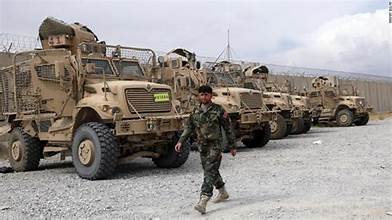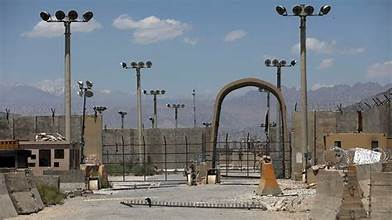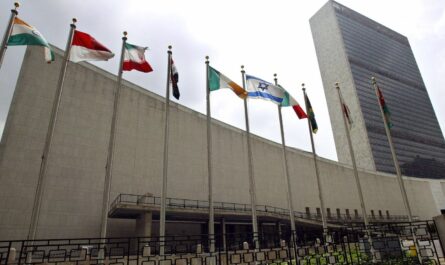In recent days, former U.S. President Donald Trump has once again found himself at the center of global attention with remarks directed at Afghanistan, specifically involving the Bagram Air Base. Known for his blunt, often unpredictable style, Trump issued what many analysts are calling a “vague threat” toward Afghanistan regarding the strategic base that has played a central role in American military operations throughout the last two decades. His comments have sparked debate not only in the United States but also in Afghanistan, raising questions about U.S. foreign policy, regional stability, and Trump’s political intentions as he continues to influence public discourse.
This blog explores the background of the Bagram Air Base, the nature of Trump’s warning, its potential implications for Afghanistan and U.S. interests, and the broader geopolitical consequences.
The Legacy of Bagram Air Base
Bagram Air Base, located near Kabul, Afghanistan, has long been considered one of the most significant military installations in the region. Built by the Soviets in the 1950s and later expanded during U.S. military involvement after 2001, the base served as the nerve center for coalition operations during the war in Afghanistan. It hosted thousands of American troops, advanced aircraft, intelligence facilities, and logistics hubs.
When the U.S. formally withdrew from Afghanistan in 2021, the sudden abandonment of Bagram became a symbol of the chaotic exit. Critics argued that leaving the base in such haste not only emboldened the Taliban but also raised serious questions about America’s long-term strategy in South Asia. To many observers, Trump’s latest comments appear to revisit this contentious decision and highlight lingering frustrations over how the U.S. departure was managed.
Trump’s Ambiguous Threat
In his characteristic fashion, Trump delivered his warning without fully clarifying what actions he expected or what consequences might follow. Reports suggest he expressed concerns about how Afghanistan’s current rulers may be using or allowing others to access the base. While Trump stopped short of directly outlining military retaliation or diplomatic measures, his wording carried a tone of intimidation that left much open to interpretation.
For some, the lack of specificity is part of Trump’s broader strategy: keeping opponents guessing. This approach, sometimes referred to as “strategic ambiguity,” has been a recurring theme in his political style. By not spelling out the details, Trump creates uncertainty, which can be both a source of leverage and a cause of anxiety.
Why the Bagram Air Base Still Matters
Although U.S. forces are no longer stationed at Bagram, the site remains geopolitically important. Its infrastructure and location make it valuable for regional powers. Afghanistan’s leadership, now under Taliban control, has reportedly explored relationships with China, Russia, and other regional actors. Should foreign governments gain access to the base, it could alter the balance of power in South Asia and potentially threaten U.S. interests.
Trump’s comments suggest he is deeply concerned about this scenario. To him and his supporters, allowing rivals such as China to establish influence at Bagram would represent not only a strategic failure but also a direct challenge to American power.

Domestic Political Calculations
Trump’s statement is not just about Afghanistan; it is also about U.S. politics. As he continues to maintain a strong presence on the political stage, his foreign policy critiques serve as a tool to energize his base. By highlighting perceived mistakes of the Biden administration regarding the Afghanistan withdrawal, Trump positions himself as the leader who would have handled things differently.
His warning over Bagram could therefore be seen as a reminder to his supporters that he remains vigilant about American security. It also reflects his desire to keep foreign policy issues in the public conversation, particularly those that can be framed as failures of his political opponents.
Trump Warns Afghanistan with Ambiguous Threat Over Bagram Air Base
Afghanistan’s Response and Regional Implications
While Trump’s remarks were aimed at Afghanistan, their ripple effect extends across the region. Afghan authorities, though currently seeking legitimacy on the international stage, have been cautious in their response. Directly confronting Trump could further complicate their already fragile relations with Western governments.
For neighboring countries such as Pakistan, India, China, and Russia, Trump’s ambiguous threat underscores the volatility of U.S. policy on Afghanistan. Even though he is not currently in office, Trump’s influence remains significant, and his words could shape diplomatic calculations. If Afghanistan were to allow foreign powers to establish a foothold at Bagram, it could trigger a new round of regional competition, with implications for trade, security, and counterterrorism.
Strategic Ambiguity: Strength or Weakness?
One of the key debates arising from Trump’s comments is whether strategic ambiguity is effective in this context. Supporters argue that leaving opponents uncertain about U.S. actions can deter them from making bold moves. Detractors, however, warn that vague threats without clear follow-through risk damaging credibility.
In the case of Afghanistan, ambiguity might not be enough. The Taliban leadership has shown a willingness to defy Western pressure in pursuit of their own goals. Without concrete steps or clear policy commitments, Trump’s warning could be dismissed as political rhetoric rather than a serious strategic stance.

Global Reactions and Media Coverage
Unsurprisingly, international media outlets picked up Trump’s remarks and offered mixed interpretations. Some analysts described the statement as a warning shot, a signal that future U.S. administrations may revisit their approach to Afghanistan. Others saw it as a reflection of Trump’s style of making bold pronouncements without necessarily providing detailed policy frameworks.
In either case, the ambiguity has sparked renewed debate about America’s long-term role in Afghanistan and the broader region. It also raises the question of whether U.S. policymakers will revisit Bagram as a strategic asset, even after the withdrawal.
Looking Ahead: What’s at Stake?
The situation surrounding Bagram Air Base is emblematic of larger issues in U.S. foreign policy. Will the U.S. re-engage in Afghanistan in some capacity, or has it permanently closed that chapter? Can Afghanistan maintain independence in how it manages the base, or will regional powers inevitably become involved?
Trump’s vague threat, while lacking in detail, underscores how unresolved these questions remain. It also illustrates the enduring importance of Afghanistan in global geopolitics, even after the formal end of America’s longest war.
Conclusion
Donald Trump’s ambiguous threat to Afghanistan over Bagram Air Base is a reminder that U.S. involvement in the region is far from over, at least in political and strategic terms. While the base is no longer under American control, its symbolic and practical significance continues to shape discussions about security, influence, and diplomacy in South Asia.
For Afghanistan, the challenge lies in navigating this renewed spotlight while balancing relationships with regional powers. For the United States, Trump’s comments reveal how deeply the debate over Afghanistan remains embedded in domestic politics. And for the world, it is yet another example of how ambiguity, while powerful in some circumstances, can also generate uncertainty that carries real risks.



